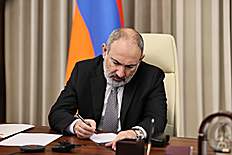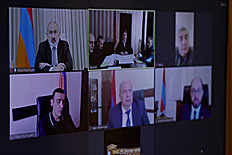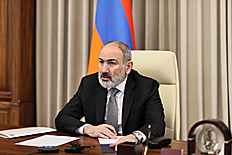Press releases
PM Pashinyan chairs the meeting of the operational headquarters for the managment of the emergency situation in Lori and Tavush regions
more 2 photos
Prime Minister Nikol Pashinyan chaired the remote meeting of the operational headquarters for the managment of the emergency situation in Lori and Tavush regions. The latter was attended by Chief of Staff of the Prime Minister Arayik Harutyunyan, Minister of Territorial Administration and Infrastructure Gnel Sanosyan, who heads the operational headquarters, Deputy Minister of Internal Affairs - Director of Rescue Service of the Ministry of Internal Affairs Kamo Tsutsulyan, Lori Governor Aram Ghazaryan, Tavush Governor Hayk Ghalumyan, head of Alaverdi community Davit Ghumashyan, Mayor of Tashir Edgar Arshakyan and Mayor of Dilijan Davit Sargsyan.
At the beginning of the session, the Prime Minister noted that the purpose of the session is to discuss the first results of the work of the operational headquarters formed to manage the consequences of the floods that occurred in Tavush and Lorva regions. "First of all, on behalf of the government and the people, I would like to express my condolences to the family members, relatives and friends of the citizens who fell victim to the floods. First, I will ask Mr. Sanosyan to present a brief report on what we have at this moment," the Prime Minister said.
Gnel Sanosyan reported that in Lori and Tavush regions, especially in the basins of Aghstev and Debet rivers with their tributaries, a number of destructions were recorded as a result of water flooding. "Particularly, we can single out five zones where the destruction is significant: Alaverdi, Tashir, the section from Alaverdi to Ayrum, the section from Ayrum to Bagratashen and the section from Dilijan to Ijevan. The greatest damage was recorded mainly in the direction from Alaverdi to Bagratashen. Various infrastructures, namely the M6 interstate road, bridges, railways, water lines, power lines, gas pipelines and other infrastructures have been damaged.
There are a number of settlements in the Alaverdi community, in particular, 9 settlements, which have a problem of connection with the city of Alaverdi due to the damage of bridges, and now works related to the organization of other transit roads for these settlements and establishing their connection are being carried out. Yesterday, throughout the whole day in Tavush and Lori regions, various state departments, representatives of the regional administration, community administration tried to work together and coordinate the works.
I must say that as of yesterday, we have a decrease of 105 cm of water in Debet River, 50 cm, 70 cm of water in various other tributaries, which has facilitated the implementation of coastal protection and other works since early morning. We have a total of 14 damaged bridges, of which 5-6 are of smaller size, there are also smaller bridges of community importance," said Gnel Sanosyan.
According to him, there are a number of settlements that have been cut off electricity, in some of them electricity has been restored, but there are settlements, in particular, about 2500 residents of Lori region and about 1000 residents of Tavush region are still deprived of electricity. There are also problems with gas supply in a number of areas.
"Yesterday, together with the partners of the Urban Development Committee, we also invited bridge construction specialists who carried out inspections of the bridges that were preserved and not destroyed. However, we tried to understand their condition. From early this morning, the specialists went to the areas where the bridges were destroyed and there is a communication problem with these settlements, so that we can see, assess what restoration works or short-term measures can be taken to restore the bridges.
During the entire process, the Rescue Service employees worked and carried out the evacuation of people. The rescue service, in particular, brought out 429 people from different areas, most of them, of course, about 380 from Lori region, the rest from Tavush region. The work in the remaining directions continues. Today, as I mentioned, the rivers have dropped to a certain level and it gives us the opportunity to assess the situation better and carry out work. Now the five settlements located on the left bank of the Debet River, the road to those settlements is being unblocked so that we can establish contact, the rest of the works are mostly in progress," said the Minister.
According to him, the railway was also heavily damaged, about 2.5 km in total. "Serious damage has been caused and it will take a long time to restore the railway connection. The M6 road suffered very serious damage, the road was either completely or partially destroyed in about 8-9 sections. Serious damages were caused to five sections of the M4 interstate road, but yesterday's coastal protection works made it possible to keep the road, albeit damaged, passable. Since early morning, it is already possible to travel through the Ayrum-Bagratashen section, there are no major damages and the road is already passable," said the head of the operational headquarters.
At the same time, it was noted that the evacuated citizens have been sheltered either in the apartments of their relatives or in hotels. 2 pregnant women were taken to the hospital for medical examination.
Kamo Tsutsulyan, Deputy Minister of Internal Affairs and Director of the Rescue Service of the Ministry of Internal Affairs, reported that 13 units with 3 operative groups are carrying out rescue operations in the coastal areas.
Prime Minister Pashinyan stressed that none of the evacuated citizens had problems with accommodation. "Besides, here we again specially recorded and saw the peculiarity of our people, because, in fact, most of them settled in the houses of their relatives, friends, and acquaintances," said the Prime Minister.
Gnel Sanosyan informed that a storage point was created in the Alaverdi community hall where food was stored in order to meet the needs of the displaced persons. A needs assessment is now being carried out by the heads of communities, and according to this, food and other issues will be addressed. It was also noted that more than 50 cars were covered in water and that number may increase.
Prime Minister Pashinyan noted that there have been floods in Alaverdi and other areas before. "It turned out that according to the official records, it was recorded in Tashir on July 5, 1972, on May 18, 1983. Moreover, it is interesting that in both previous cases, the volume of water was more than yesterday's flooding. And in the Debed River basin and Alaverdi, one flood was recorded on May 19, 1959 and a second flood on May 16, 1966. And interestingly just for statistics, the 1959 flood was stronger than the current flood, but the 1966 flood was weaker.
In this sense, of course, we must analyze the engineering problems of the collapsed sections," said the Prime Minister.
On his part, Gnel Sanosyan noted that it is necessary to conduct a general review and carry out cleaning, as well as coastal protection and fortification works in the riverbeds. It was also reported that houses and other objects also collapsed as a result of the floods.
The Prime Minister also inquired how the restoration of the destroyed parts will be carried out, is there a specific plan for restoration, is there an estimate of how many kilometers of roads have been completely destroyed and how many kilometers of roads have been partially damaged?
"Perhaps, they are not large in terms of kilometers, 20-meter, 50-meter sections are damaged, but especially the M6 road has many damages, considering that the entire road is missing in 3-4 sections. Therefore, the volumes will be large. It will be easier to restore the damaged sections of the M4 road, taking into account that the damage is partial," reported the Minister of Territorial Administration and Infrastructure Gnel Sanosyan and added that the works on the M6 road will require a long time and resources.
The Prime Minister instructed to act on the principle of urgency regarding the restoration of the M6 road.
As for the situation related to the blocked villages, the Prime Minister instructed to provide supplies of goods by helicopters. Nikol Pashinyan ordered short-term needs to be inventoried and implemented in an urgent mode, as well as mid-term and long-term needs to be inventoried. "But in general, now it is important to be able to carry out an objective evaluation of damage," added Nikol Pashinyan.
During the session, international support in solving existing problems was also highlighted.
Summing up, the Head of the Government thanked for the work done and added. "Actually, I visited all the places yesterday, I saw that our services, agencies - local self-government bodies, regional administrations, the rescue service responded promptly. I told the citizens, and they also shared that view, that the damage and consequences of this disaster could have been much more severe, but also the operative work, the fact that all the bodies responded on time from late evening, midnight, gave us the opportunity to, as much as possible, mitigate the damage that the disaster could have caused.
Now, yes, we should focus on dividing into three layers: short-term needs: quick response, medium-term needs and long-term. We need to make some conclusions in our road construction and urban construction standards, if we have to make some revisions, analyzing the consequences of this disaster, this work must be done as well.
Of course, the operational headquarters should become the center where the information is concentrated, and according to your suggestions, instructions will also be given, so that we can continue the long-term work in all these directions".
The number of victims due to floods is currently 4.




